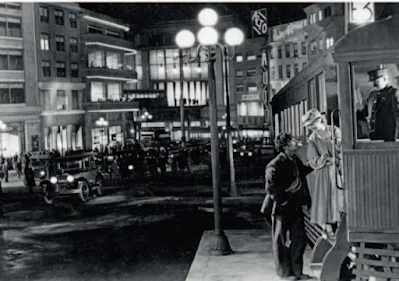In the transformative year of 1927, when cinema was on the brink of a revolutionary shift with the advent of "talkies," F. W. Murnau's silent masterpiece, "Sunrise: A Song of Two Humans," silently echoed through the picture palaces, weaving a narrative rich in emotion and symbolism.
Set in a lakeside village, the film unfolds a tale of clandestine love, temptation, and the redeeming power of innocence. The protagonist, a rustic man seduced by the allure of the city, grapples with the moral dilemma of betraying his sweet young wife. The tension builds as he contemplates a chilling suggestion: "Couldn't she get drowned?"
Murnau's mastery unfolds in the rural setting, with creeping fog and shadowy scenes reminiscent of his iconic vampire movie, "Nosferatu." The film tantalizes with the promise of sensationalist storytelling—sex, death, violence, and betrayal. The woman from the city, embodying the amorality of the metropolis, contrasts sharply with the symbol of rustic innocence embodied by the man.
As the plot thickens, the expected narrative of corruption takes an unexpected turn. The couple finds themselves on a tram bound for the city, where the metropolis works its magic, creating a surreal second courtship for the protagonists. The viewer is treated to unforgettable sights—crowds, street carnivals, and bright lights painting hallucinogenic patterns.
The central conflict reaches its climax when the man, unable to go through with the murder, follows his wife to the city. Yet, danger lurks, and the past proves difficult to escape. Murnau's ambitious vision comes to life as the film unfolds in vast, complex, and expensive sets, solidifying "Sunrise" as a pinnacle of silent cinema.
The film plays like a montage of the silent era's greatest hits—melodrama, suspense, horror, spectacle, slapstick, and tragedy. While the US release added a Movietone soundtrack, the movie's silent beauty stands on its own.
The closing title card encapsulates the timeless message: "Wherever the sun rises and sets, in the city's turmoil or under the open sky on the farm, life is much the same; sometimes bitter, sometimes sweet."
"Sunrise" remains a cinematic symphony, a last waltz of silent films that continues to captivate audiences, transcending the boundaries of time and technology.

